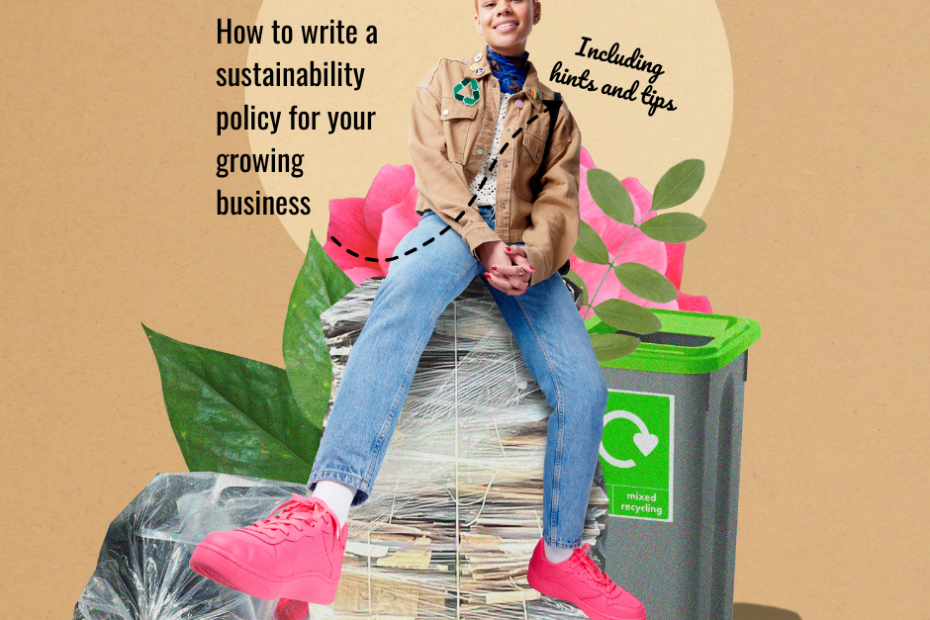A sustainability policy is one of the simplest ways to show your business is serious about doing good, not just for profits, but for the bigger picture. More customers are choosing companies that care about people and the planet, so putting your values into writing makes business sense as well as ethical sense.
If you’re a small business or start-up, this doesn’t have to be complicated. In fact, keeping your sustainability policy clear and practical will make it easier to stick to.
Here’s how to write yours.
Step 1: Decide why you’re writing it.
Before you start, ask: what matters most to my business and my customers?
-
Do you want to cut waste?
-
Support local suppliers?
-
Reduce energy use?
-
Make your workplace fairer and healthier?
Your sustainability policy should reflect your values. Keep it real, not generic.
Step 2: Remember it’s about more than recycling.
When people think of sustainability, they often jump straight to renewable energy or reducing waste. But a strong sustainability policy goes further.
It’s also about social sustainability.
Treating employees fairly, working with ethical suppliers, and supporting your community. It’s about making decisions that create long-term benefits for people as well as the planet.
For example, you might commit to:
-
Offering flexible work options to improve wellbeing.
-
Prioritising diversity and inclusion in your hiring.
-
Partnering with local charities or community groups.
These actions show your business takes a holistic view of sustainability, not just what you use, but how you work.
Step 3: Keep it short and clear.
A sustainability policy doesn’t need to be a long corporate document. One page is often enough. Think of it as a promise:
-
Who you are: a quick introduction to your business.
-
Your goals: the changes you want to make (e.g., reduce single-use plastics, switch to renewable energy, recycle office waste).
-
Your actions: the practical steps you’ll take.
-
Your commitment: how you’ll review progress.
Tip: Write in plain language. The easier it is to understand, the more likely your team (and customers) will back it.
Step 4: Make it practical.
Don’t list goals you can’t measure.
Choose a few areas to start and set realistic actions. For example:
-
“We will recycle paper, plastics, and e-waste in all office spaces.”
-
“We will buy from suppliers with fair trade or eco-friendly certifications where possible.”
-
“We will reduce electricity use by switching to LED lighting and using smart controls.”
The key is to track your progress. Simple methods work best:
-
Keep a monthly log of recycling collections or waste output.
-
Ask suppliers to confirm certifications and keep them on record.
-
Compare utility bills before and after energy changes to see savings.
By attaching numbers, records, or regular check-ins to your commitments, you’ll know if your sustainability policy is actually working.
Start small and build up. The point is to create momentum, not overwhelm your business.
Step 5: Share it and stick to it.
Once written, your sustainability policy should live beyond a Word doc:
-
Share it with your team.
-
Add it to your website.
-
Remind yourself of it when making decisions.
Review it every year. Are you hitting your targets? Can you push a little further?
Step 6: Think about next steps.
Writing a sustainability policy is the start. From there, you could work toward B Corp certification, which shows the world your business meets the highest standards of social and environmental impact.
Curious what B Corps are and how they work? We’ve written a simple guide: What Are B Corps?
Or you can learn more directly from the B Lab website.
Why this matters for your workspace.
If you’re growing your business, moving into a professional office might be the next step. At Obsidian Offices, we want to make that transition easier, and greener.
-
And as a bonus? We’re offering extra discounts on serviced offices for companies with a sustainability policy or B Corp certification.
It’s our way of supporting companies that are building a better future.
A sustainability policy isn’t about being perfect.
It’s about showing progress, committing to change, and backing it up with action. Start simple, keep it genuine, and let it grow with your business.
by Clare Wellstead
Ready to take your next step, both in impact and in office space?
